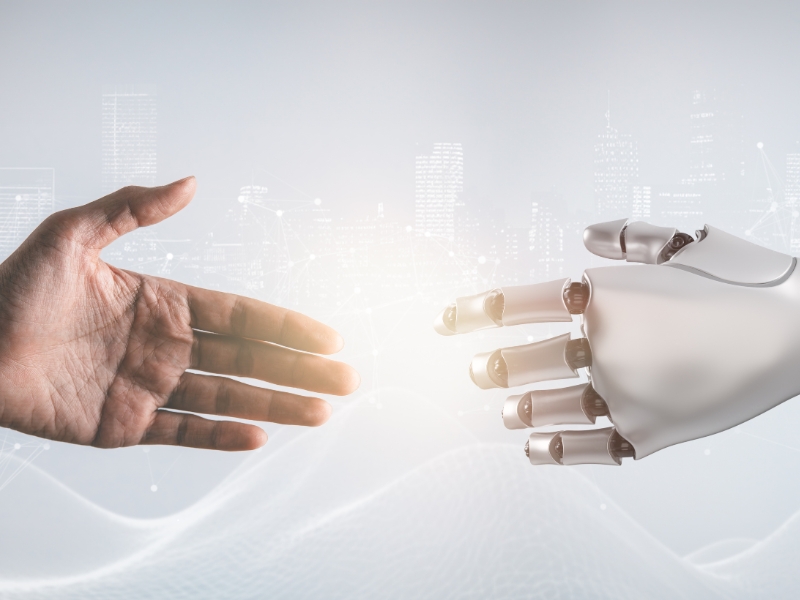By Pip Duma
Is AI Really Taking Over Jobs? The Pros and Cons in Today’s Digital World
It’s one of the hottest debates in tech right now...
Is AI coming for our jobs, or is it simply changing the way we work?
For some, AI sparks excitement with its promise to speed up processes, cut costs, and unlock new opportunities. For others, it raises concerns about job security, ethics, and whether machines will eventually replace human creativity.

This week National Coding Week 2025, (which is an initiative designed to encourage and inspire the next generation of coders and developers), has been shining a spotlight on the topic of Artificial Intelligence (AI). So there’s no better time to dive into this discussion as we look to the future of technology and digital skills.
We’re going to unpack the pros and cons of AI in software development and digital workflows — exploring how it’s supporting developers on the ground, and what it means for businesses looking to adopt AI into their services and operations.
From coding assistants to business tools powered by machine learning, there's no doubt that AI is reshaping how we work at every level. But while it brings huge potential, it also carries risks and misconceptions that businesses and developers alike need to consider.
AI in Coding & Development
AI tools are fast becoming everyday companions for some developers. Platforms such as GitHub Copilot, ChatGPT, and Tabnine are helping to streamline tasks that once took hours. From suggesting code snippets to troubleshooting bugs in record time, it's no wonder that developers are turning to AI tools to help them complete tasks and streamline code.
Pros of AI in coding:
✅ Faster coding: Autocompletes boilerplate code and reduces repetitive tasks.
✅ Smarter debugging: Flags errors and suggests fixes instantly.
✅ Better documentation: Auto-generates explanations, tests, and notes to maintain cleaner codebases.
✅ More innovation time: Frees developers to focus on problem-solving and new features.
Cons of AI in coding:
❌ Accuracy isn’t guaranteed: AI can “hallucinate,” generating flawed or insecure code.
❌ Over-reliance risk: Devs may lose touch with best practices if they accept AI outputs blindly.
❌ Skills gap danger: Coding knowledge is still essential — AI can support but not fully replace human expertise.
AI in Business Transformation
The ripple effects of AI in tech and software development are already shaping industries. Faster delivery cycles, cleaner code, and more scalable solutions, all add up to measurable value for businesses. But, like developers, businesses must also balance the benefits of implementing AI into their services and systems with careful planning and oversight.
Pros of AI in business:
✅ Faster delivery: New products and features reach the market quicker.
✅ Reduced errors: Fewer bugs mean more reliable platforms and happier customers.
✅ Scalability: Teams can achieve more without scaling headcount equally.
✅ Competitive advantage: Early adopters of AI-led processes can outpace competitors.
Cons of AI in business:
❌ Misconceptions: Many assume AI can “do it all” — but without skilled developers, outputs may fall short.
❌ Security concerns: AI-driven solutions can introduce risks if not implemented carefully.
❌ Investment pitfalls: Businesses chasing AI hype without clear strategy risk wasted spend.
Things to Consider Before Adopting AI into your work
We need to remember that AI isn’t a magic solution, you can't just drop it into place overnight and expect immediate success without effort. Adopting it blindly risks wasting time, money, and credibility. Before integrating it into your workflows, services and overall business, you need to ask yourself the following:
- What problem are you solving? - Avoid adopting AI for the sake of hype.
- Do you have quality data to work with? - Poor inputs lead to poor results.
- Who will oversee it? - Human review and accountability remain vital.
- How do you protect security and IP? - Make sure compliance is covered.
- What does success look like? - Define clear KPIs (e.g. faster delivery, reduced errors, better scalability).

Adapting to the AI Shift
AI adoption doesn’t mean humans are out of the picture but it does mean roles and workflows are evolving. Businesses and professionals can prepare by:
🧑🏫 Upskilling: Learn how to work with AI tools, not against them.
💡 Focusing on creativity and strategy: Lean into areas machines can’t replicate.
🔒 Experimenting safely: Pilot projects before large-scale rollouts.
🤝 Encouraging collaboration: Foster teams where AI supports, not replaces, human talent.
Those who embrace AI as a co-pilot rather than a competitor will be better placed to thrive in a changing digital landscape.
So, Will AI Take Our Jobs?
AI might be smart but it was still built from the Human experience. Whilst we have no doubt the debate will continue, here at Sequel we believe one thing is clear: AI is here to stay.
It’s powerful, practical, and capable of transforming the way we work for the better — but it still needs human thought, creativity, and oversight to be effective.
Rather than replacing developers or entire teams, AI is becoming a tool that speeds up routine tasks, leaving more time for innovation and problem-solving. In business, it offers huge advantages to those who adopt it thoughtfully, but risks for those who rush in blindly.
So, is AI taking over jobs? Not quite. But ignoring it isn’t an option either. The winners in this new era will be the businesses and workers who adapt, embrace change and use AI as a lever for progress, not a shortcut.
What do you think? We'd love to continue the discussion, so drop us a message!
Don't forget to connect with us on socials

